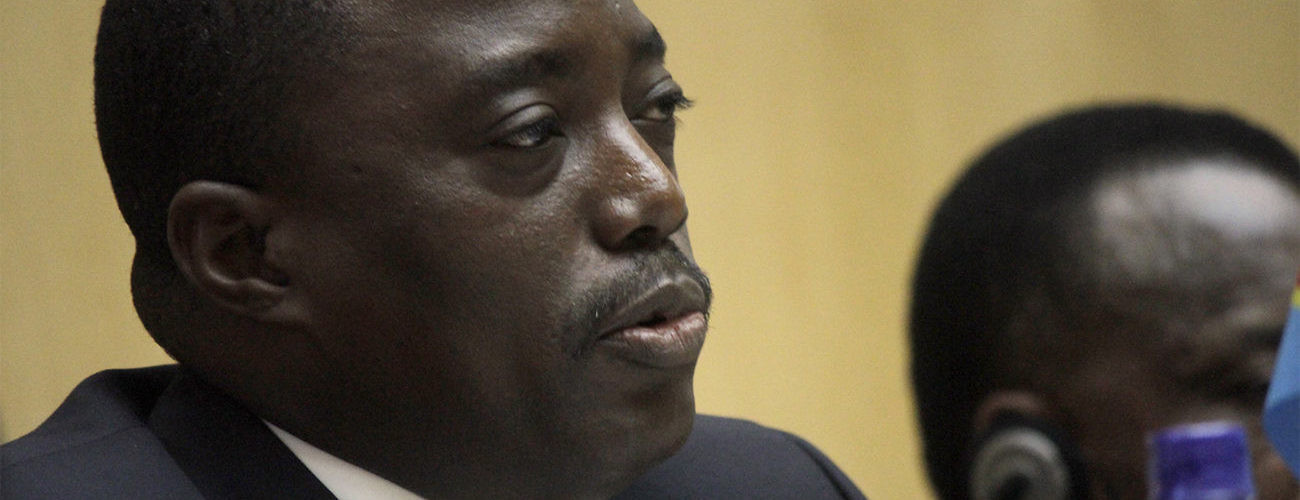Joseph Kabila, President of the Democratic Republic of Congo, waits for the signing of the Congo peace agreement, in Addis Ababa, Ethiopia, Sunday, Feb. 24, 2013.(AP Photo/ Elias Asmare)
On the last Sunday of May, President Joseph Kabila joined residents in the capital, Kinshasa, to register for the Democratic Republic of the Congo’s long-awaited general elections. In doing so, Kabila added his name to the voters’ roll already containing the details of more than half of the estimated 45 million Congolese who are expected to register for the ballot. The symbolism of Kabila’s act cannot be overstated, given the ongoing uncertainty as to whether the watershed election—which promises to deliver the first democratic change of government in the country—will occur as per a deadline prescribed by a Catholic Church-brokered New Year’s Eve peace accord.
Yet days after his act of reassurance, Kabila again cast doubt over his commitment to both the New Year’s Eve peace accord and its most sacrosanct tenet—the organization of a ballot by December 2017 which the incumbent would be disallowed from contesting. In a rare interview with the German newspaper Der Spiegel, Kabila denied claims that he had promised to organize elections by year-end, instead claiming that he viewed the socio-economic and political situation in the Democratic Republic of the Congo (DRC) as being wholly inadequate for the scheduling of the ballot. Kabila also refused to rule out the possibility that he could contest the vote for an unprecedented third successive term—a potential outcome which conceived the ensuing political crisis in the central African state. Coinciding with the Der Spiegel interview, the issue of an election deferral and Kabila’s candidacy were being tentatively broached by Kabila’s allies. In May, the ruling People’s Party for Reconstruction and Democracy (PPRD) spokesman, André Alain Atundu, called on the country’s government to grant the Congolese people “the right to express themselves through a referendum”—a reference to the voting process which Kabila proposed to decide whether he should stand for a third term. In recent weeks, Human Rights Watch reported that the government-aligned Télé 50 television station has also broadcast advertisements juxtaposing violent civil unrest in several African countries with peaceful referenda which recently took place in the neighboring Republic of Congo and Rwanda.
The prevailing narrative by Kabila and his cohorts suggests that the DRC faces a binary political future, both of which are likely to see the incumbent remain at the apex of the country’s polity. Either Kabila will continue to use a lack of funding and regional insecurity to delay the scheduling of the vote, or—perhaps most concerningly—that any scheduled ballot will be preceded by a divisive referendum which would facilitate Kabila’s bid for re-election. Based on current developments, the former appears to be the more likely outcome, with the president of DRC’s electoral commission, Corneille Nangaa, declaring in Paris on July 7 that “it will not be possible” to hold presidential and legislative elections “before the end of the year” —a statement which Kabila’s main antagonist, the opposition Rassemblement coalition, cited as a “declaration of war” and evidence of Nangaa’s allegiance to Kabila.
Despite their belligerent rhetoric, options available to Rassemblement to change the prevailing political status quo in the DRC appear limited. While the collective’s initial formation saw it capable of mobilizing tens of thousands of Congolese on the streets to pressure Kabila to the negotiation table, it seemingly no longer enjoys such pull. The primary reason for this lies in the death of its leader, Etienne Tshisekedi, who passed away from natural causes in Brussels in February 2017. In the fragmented DRC, Tshisekedi emerged as one of the few political leaders whose support base transcended ethno-political cleavages and, perhaps most importantly, exhibited the tenacity to mobilize that support into defiant mass mobilization. Following his death, a leadership vacuum has ensued within Rassemblement, which has seen its leadership turn on each other for primacy within the movement. The coalition has lost further cohesion—and with it, legitimacy—after some of its leaders jumped ship and formed part of the transitional government created by Kabila as prescribed by the New Year’s Eve accord. Further limiting the potential for a widespread protest campaign has been the implementation of an ongoing protest ban in Kinshasa, in addition to a harsh crackdown on civil society movements such as the powerful Struggle for Change (LUCHA) civic movement, which has emerged as being more capable of mobilizing the country’s protest-fatigued population in a post-Tshisekedi context.
Outside of protest, the only real punitive measures available to curtail Kabila come in the form of international sanctions against the incumbent and his cabal. This process has already seemingly commenced, with the United States Treasury freezing the assets of Francois Olenga, the head of the Military Household of the President. Olenga is believed to be the masterminded of the aforementioned security crackdown. US sanctions against the military leader were accompanied by similar measures employed by the European Union against 16 members of the Kabila administration who face both asset freezes and travel bans. The extent to which sanctions have become the only punitive measure available to stakeholders to the DRC’s political impasse was further underlined when US Deputy Ambassador to the United Nations, Michele Sison, warned of expanding such measures in response to Nangaa’s suggestions of a likely electoral deferral.
Whether sanctions will prove successful in ensuring Kabila conforms to the DRC’s political roadmap is yet to be seen. However, with Kabila becoming increasingly emboldened in his actions to extend his political longevity, it would be difficult to believe that such travel and financial embargoes alone will sway the incumbent from delivering the coup de grace to his country’s hopes of achieving a democratic transfer of power in the near-term.





